The purpose of the NC Farm to Preschool Network (NCF2PSN) is to connect, educate, develop, and share resources between community and state partners, farmers, early childhood educators, and families to spark the local foods movement in early childhood education environments.
|
|
Farm to Preschool in Action
|
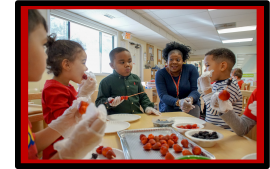 Heart Kabobs Heart Kabobs
On February 14 the LaPetite Academy Preschool 2 classroom invited Shironda Brown, Farm to Early Care and Education Training Project Coordinator, in to conduct a healthy cooking activity. The children were given strawberries, raspberries, blueberries, and blackberries to make healthy heart kabobs to celebrate Valentine’s Day. The children talked about each fruit and how they tasted. As well as, the importance of choosing to eat the fruit provided instead of the sugary snacks, i.e. cupcakes, cookies, candy that are normally present for holiday parties. The children further added to the discussion that if they eat the fruit then their bodies will grow big and strong.
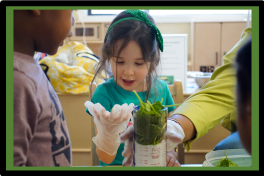 Shamrock Smoothie Shamrock Smoothie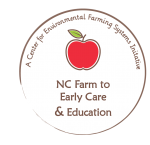 added water, honey, and spinach to the smoothie maker. The children mixed all the ingredients and dispensed their smoothies into individual cups to taste. They also took the pineapple they cut into chunks and placed them on a plate to eat. The pineapple represented the pot of gold that is usually gold chocolate coins. added water, honey, and spinach to the smoothie maker. The children mixed all the ingredients and dispensed their smoothies into individual cups to taste. They also took the pineapple they cut into chunks and placed them on a plate to eat. The pineapple represented the pot of gold that is usually gold chocolate coins.
Learn more about Shrionda Brown in this month's section of Who's Who.
|
|
Let It Grow...Super Tall and Sunny!
|
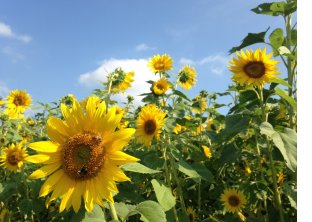 by Maria Hitt by Maria Hitt
Sunflowers are SO much fun to grow. They are easy to start from seed, there are loads of beautiful colors and varieties to choose from, and they attract birds and bees for your children to observe.
Varieties range from the smaller flowered ornamental Teddy Bear or Autumn Beauty to the giant Mammoth with flower heads almost a foot wide! These big ones can be dried to collect seeds for eating. Children will have lots of fun watching them grow, and grow, and GROW–some can get to be 10-12 feet tall! You can use this as a math activity for your class to measure the height of the plants over time and create a graph in your classroom.
You can start the seeds in pots or directly in the garden. They can be started any time during April or May and will grow all summer long. Dig a 6 to 8 inch bed along the edge of your playground fence, add some compost to the soil, and plant seeds every 4-6 inches. If you have a big space available you can make a sunflower house. Make a 10 x 10 foot square or circle in a sunny spot. Dig a planting area about a foot wide along the edge of the shape. Add some compost to enrich the soil and leave a space on one side for a doorway. Plant a variety of sizes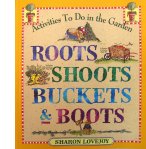 and colors of sunflowers in 3 rows all the way around the square and as they grow your “house” will be created. You could also plant sunflowers in a spiral or simple maze. This theme garden will need protection from children’s little feet, munching rabbits, and deer, especially while the plants are small. For instructions on the sunflower house and other themed gardens, check out the book, Roots, Shoots, Buckets and Boots by Sharon Lovejoy. and colors of sunflowers in 3 rows all the way around the square and as they grow your “house” will be created. You could also plant sunflowers in a spiral or simple maze. This theme garden will need protection from children’s little feet, munching rabbits, and deer, especially while the plants are small. For instructions on the sunflower house and other themed gardens, check out the book, Roots, Shoots, Buckets and Boots by Sharon Lovejoy.
Sunflower activities
There are many games and activities you can make related to sunflowers. Sunflower hats can be made by cutting the center of a paper plate into 8 triangles and gluing on cut-out flower petals. Or you can make a matching game by cutting out pictures of sunflowers from two of the same seed catalogs and laminating them. There are also many resources online that show the sunflower life cycle that you can teach your children, as well as books and puzzles that illustrate the life cycle. Get creative!
For more planting ideas here is a plant list for pre-K gardens.
|
|
Whip It Up!...Menus and Recipes
|
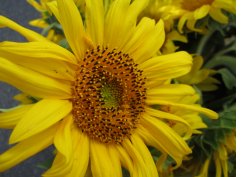 Did you know that protein-rich sunflower seeds can be used to meet half of the meat/meat alternate requirement in a CACFP meal? Did you know that protein-rich sunflower seeds can be used to meet half of the meat/meat alternate requirement in a CACFP meal?
For example, at lunch, instead of serving 2 ounces of cheese or meat to your older children, you can serve 1 ounce of cheese and 1 ounce of sunflower seeds (about ¼ cup)
Here are some other suggestions to add crunchy and nutritious sunflower seeds to meals:
Sprinkle on breakfast cereals or oatmeal.
Use as a topping on salads or slaw–how about an apple, celery, walnut and sunflower seed salad?
Mix with Chex, peanuts, craisins, and pretzels for a fun snack mix.
Replace half the meat in tacos with sunflower seeds.
Sunflower butter (or “sunbutter”) is a great option for centers that are peanut-free. Sunflower butter is credited in CACFP the same as peanut butter (3 TB at lunch or 1 TB at snack for 3-5 year olds). Serve sunflower butter in sandwiches, with crackers or rice cakes, in celery, and as a dip with apples and bananas.
|
|
Where to Find the Beans...Funding Opportunities
|
We're always on the look out for funding opportunities. Stay tuned for June's edition to see what we've found. |
|
NC Farm to Preschool Network Advisory Committee Member
 Shironda Brown Shironda BrownTraining Project Coordinator
Farm to Early Care and Education Initiative
North Carolina State University
Shironda Brown is the Training Coordinator for the Farm to Early Care and Education Initiative at the Center for Environmental Farming Systems (CEFS). Shironda earned a B.S. degree in Child Development and Family Relations from East Carolina University. She has worked in the early childhood field for over twenty years as a classroom teacher, education coordinator, and center director. We are happy to welcome her as one of the Network's newest Advisory Committee Members.
|
|
Have something to share in our e-newsletter?
Submit your request to:
Kim Knoppel kim@asapconnections.org. |
|
|
|
Farm to CACFP:
Getting Started with Local Foods
May 1, 2019 at 1:00pm
Join this one hour webinar and learn how gardening and nutrition activities paired with eating local foods can "plant the seeds" for healthy eating habits while supporting local economies.They'll be sharing lots of resources and tips to help you get started with local foods! Register here.
|
|
Like us on Facebook and you'll get the most up-to-date information on resources, events, webinars, and more!
|
|
|
Sunflower House
By Eve Bunting
A boy plants a circle of sunflower seeds in the spring and up grows a sunflower house! All summer long he plays in it with his friends, until one day the leaves start to turn brown and the sunflowers droop. Is it the end of the sunflower house forever?
|
|
This Week in the Garden @ Preschool
|
|
National Early Childhood Inclusion Institute
May 7-9, 2019
Chapel Hill, NC
National Farm to School Conference - Canada
May 15-17, 2019
Victoria, British Columbia
Children & Nature Network International Conference
May 16-18, 2019
Oakland, CA
Early Childhood Physical Activity Institute
May 20-22, 2019
Raleigh, NC
Georgia Farm to School and ECE Summit
June 7-8, 2019
Macon, GA
Childhood Obesity Conference June 15-18, 2019
Anaheim, CA
QRIS National Meeting
June 25-27, 2019
New Orleans, LA
27th annual National Children & Youth Garden Symposium
July 10-13, 2019
Madison, WI
NC Extension Events
Statewide, NC
Food Sovereignty Summit
September 23-26, 2019
Green Bay, WI
Community Food Systems Conference
December 9-12, 2019 Savannah, GA
Video Case Studies:
Minnesota Farm to Head Start
Institute for Agriculture & Trade Policy has shared a new set of videos featuring dynamic Farm to Early Care activities happening in Head Start programs across Minnesota. The video series has a special focus on how Head Start programs are incorporating culturally relevant foods and classroom activities into Farm to Early Care initiatives. Watch the case study video series here.
|
|
|